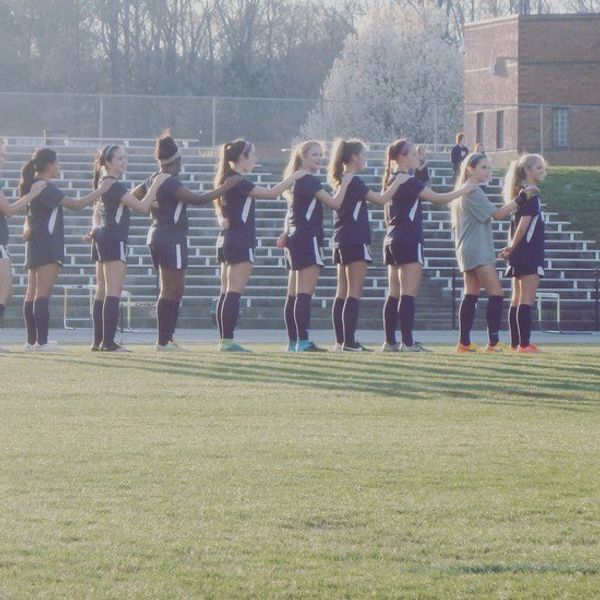I interviewed Mrs. Adams, a fourth year teacher at Adrian High School. She teaches pre-calculus and geometry to classes comprised of eighth through twelfth graders. Her philosophy of education is focused around teaching students responsibility. This emphasis on responsibility shone through all of her answers during the interview process.
It is clear that she values responsibility because when asked what her students need from her, she explained that the one thing that students need from her more than anything else is the lesson that she teaches her students daily- the importance of assuming accountability for themselves. She explained that many students expect and/or need her to “hold their hands” during every assignment. They won’t even attempt a homework assignment without help. She explained that she knows her students can figure out a lot of the mathematics on their own if they just think about it. By not answering questions fully, she requires them to think. She said this does frustrate her current students, but students often come back years later and thank her for forcing them to take responsibility of their own work because, although it is no what they wanted, it is what they needed.
Although students often fight against Mrs. Adams’ high expectations, when I asked her what she does to motivate them, she said that she finds ways to motivate them by finding ways to connect with them. She intentionally gets to know each of her students and identifies what they care about and what motivates them. By talking to them about their interests, she builds connections and trust with her students. Additionally, she finds ways to reward students for working hard in class by doing things like shortening homework assignments, letting students leave a minute early, and giving extra credit. She has also found that students are much more motivated to engage in class when they are able to interact with the lesson. Therefore, she tries to keep their attention by not lecturing much and by having students do more individual and group work in class.
Although she does find her motivational tactics helpful, when asked what her biggest struggle is as a teacher, she explained that a lack of support from administration within the realm of classroom management is a frustrating challenge that hinders her management of her own classroom. She explained that it is difficult to maintain a rule that is supposed to be school wide when other teachers do not follow it, and administration does not care. For example, students are not supposed to have their backpacks in the classrooms, but some teachers let them anyways. These inconsistencies make it very difficult to enforce any rules. Also, administration has warned teachers that if they take a student’s phone during class, they are responsible if anything happens to it. This warning makes it appear as if administration is instructing teachers to simply not enforce a cellphone policy. This nonchalant, hands-off approach to classroom management permeates the school, and it creates a culture of disregard for policy, and this makes classroom management tedious.
In spite of all the frustrations with administration, when asked if she enjoys teaching in an urban classroom, she answered that she does find teaching in an urban classroom rewarding because she is able to help students discover their own intelligence and tenacity. She said that many students do not receive much support at home, so it has great impact upon the students when she helps them realize their own greatness. She can see the potential within each student, and she draws it out by having high expectations for her students. She requires her students to be thoughtful and hard-working, and she provides the tools for her students to succeed. Working hard to succeed helps students develop confidence, and she said that seeing students grow as thoughtful and responsible individuals makes the job worth it.
Helping students find this success can be a challenge, so I asked Mrs. Adams what qualities an urban teacher must possess to find the success that she has found in her classroom. She explained that to help students discover their own greatness, one must have a significant amount of patience, as patience is the most significant quality an urban teacher can possess. Teachers must have patience to work with the students who lack motivation, but they must also have substantial patience with the students who struggle in class because of home life issues. She explained that every student has a story, and it is important to know their struggles to understand them. She noted that this sounds like a cliché, but it is genuinely true. The students that make her want to pull her hair out are the ones that she has found need her support the most. Some of the ways that patience manifests itself in her classroom are by her staying positive and sticking to her high standards. She explained that even though some students outside of her classroom face incredible struggles, she makes her classroom a positive space with a culture that respects hard work and nothing less. Students don’t always like her for this, but it is what they need, and this is what makes her a successful urban teacher.
Many of Mrs. Adams’ ideas resonated with me, especially her balance between expecting students be be responsible and accountable for themselves while also understanding that students have a lot going on outside of school. She is the image of the strict, yet loved teacher because even when she pushes students to think critically and to put in more effort, she is doing so because she cares about and sees potential in her students. This type of teacher is also described by inner-city adolescents in the article What Urban Students Say About Good Teaching. These students do not describe an ideal teacher as one that is their friend. Instead, they want teachers who make students do their work, have control of the classroom, are willing to help students, explain assignments clearly, vary the classroom routine, and take the time to get to know the students (10). They understand that for a teacher to have these qualities, he/she will not be their friend. They do not need a friend; they need “teachers who believe in them” (12). Mrs. Adams is that teacher. She may frustrate her students while they are in her classroom, but she makes her students learn. As the urban students noted, good teachers must help them learn “often in spite of themselves” (13). This is why students often return to Mrs. Adams’ classroom after they have graduated and thank her for pushing them to be responsible and thoughtful adults. This is the kind of teacher that urban students need; this is the kind of teacher Mrs. Adams is.
My definition of a quality teacher grew by both observing Mrs. Adams and by interviewing her. It was helpful to hear her explain the principles around which she constructs her demeanor and responses in the classroom. I specifically found it reassuring and informative to hear her talk about how she places responsibility on the student. I have heard varying perspectives about how much responsibility is on the teacher and how much is on the student, but her perspective on the mater makes the most sense to me. She clearly expects herself to teach well, provide class time for students to begin their work, make herself available to help students, and to connect with students to motivate them. However, she also expects the students to be accountable for themselves. I agree that this is a skill that students need to learn in school, and Mrs. Adams’ answers show how to teach that skill. She treats the students like adults and acknowledges when they fall short of their abilities and need to think for themselves. I will utilize her advice in my own classroom and provide students with all the tools to be responsible, so they can learn how to be accountable for themselves. I will do this by refusing to feed my students answers and by expecting them to think critically on their own, asking for help when they are sincerely stuck. I will talk with my students like adults and acknowledge when they were irresponsible, informing them that I expect more. I will have students who do not always like me, but will learn from me. I will be the teacher that the students need.





















